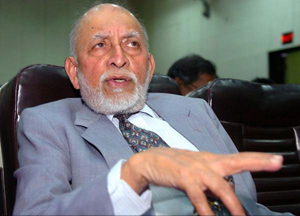Hyderabad, Jun 25: Noted scientist and Atomic Energy Commission (AEC) member M R Srinivasan today said the Centre's push to gain Nuclear Suppliers Group membership was "unnecessary, unwarranted and ill-advised", a day after India failed in its bid to clinch membership of the 48-member club.
 The AEC, a body under the Department of Atomic Energy (DAE), would have advised the government to desist from such a move had it been consulted, he said.
The AEC, a body under the Department of Atomic Energy (DAE), would have advised the government to desist from such a move had it been consulted, he said.
Srinivasan, a former Chairman of the AEC, which looks after atomic energy activities in the country, argued that NSG membership does not make a difference to India's nuclear commerce as New Delhi has signed agreements with other countries for supply of reactors and uranium.
"Unnecessarily, India made a big hype about this admission into the NSG. It was completely unnecessary because the 2008 waiver was already enabling us to have nuclear commerce with nuclear advanced countries and we already have agreements with Russia, France and the United States for reactor projects...," he said in an interview to PTI today.
India also has uranium buying agreement with multiple countries, including Kazakhstan, Canada and Australia, Srinivasan noted, adding it was an "unwarranted and ill-advised initiative" to seek entry into the group of nuclear-supplier countries set up in 1974.
The Padma Bhushan awardee said failure to get in NSG would not have adverse impact on India's nuclear programme as New Delhi has its own capability "for designing and building reactors and fuel manufacturing, reprocessing and so on."
"On the ground, it won't make any difference (on failure to get NSG membership).
We already have a waiver. We are already having cooperation with important countries and countries who are able to supply uranium. There was no need for us to subject ourselves to embarrassment. Unfortunately, our (India's) self-esteem has been dented (with this failure)," the well-known 86-year-old nuclear scientist said.
"(Had) the matter been initially brought to the Atomic Energy Commission, (of) which I am still a member, and if they (the Government) had asked if we (the Government) should proceed with this issue (seeking NSG entry), I would have said the same thing -- 'don't raise the issue'," he said.
"But it was not brought to the Atomic Energy Commission. It's unfortunate. It was thought to be the preserve of Foreign Office...Ministry of External Affairs...I do not know. Needless drama (India's diplomatic push on NSG membership) has gone on for a number of days," he said.
Srinivasan, who played a key role in the development of India's nuclear power programme and Pressurised Heavy Water Reactor (PHWR), said that no evaluation was made about the perceived benefits of NSG membership.
"...whether we should have put so much efforts...Prime Minister going to so many countries, canvassing (for NSG entry). Somebody from Foreign Office who has done evaluation, either they did evaluation and their assumptions were not borne out or evaluation was not properly carried out. I am unhappy that we should put so much importance to this thing (NSG membership)," he said.
Needless expectations were raised on becoming part of the group and so much political capital at the highest level of Government of India and Prime Minister was deployed for the purpose, the noted scientist said.
"It was a quest we could have well avoided and an embarrassment we could well have avoided," he said, pointing out that India should have sensed the mood with China and some other countries raising objections to India's membership.
He also found fault with the media's description of the NSG as an "elite group".
"How can a 48-member NSG be an elite group? It got members like New Zealand, Ireland...all these people who have no nuclear programme of any kind," he said.





Comments
Add new comment